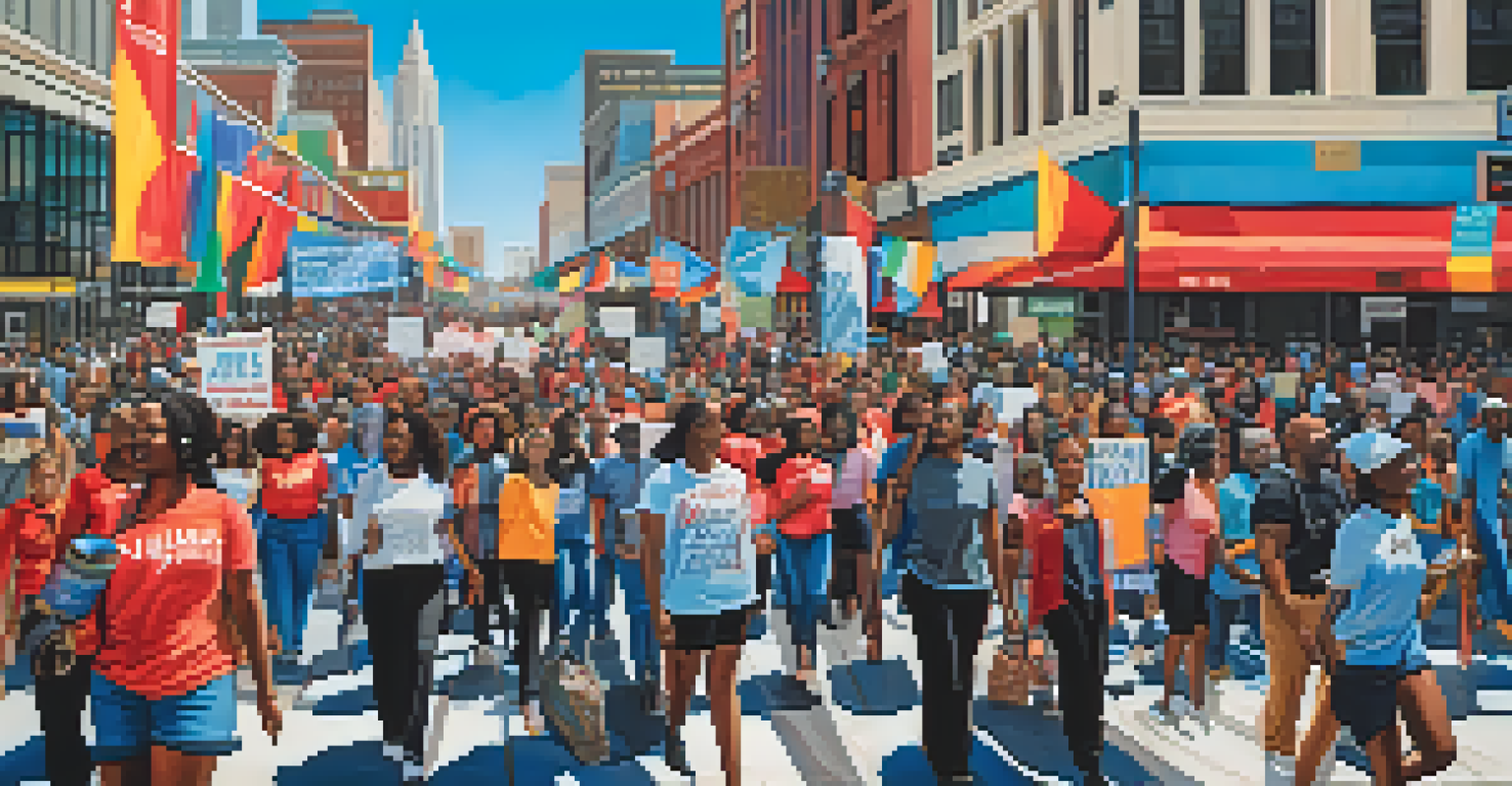Civil Rights Movement: Atlanta as a Central Battleground

Atlanta's Historical Significance in the Civil Rights Movement
Atlanta holds a unique place in the history of the Civil Rights Movement, serving as a central hub for activism and organization. Its rich tapestry of African American culture and leadership made it a natural focal point for change. The city was home to influential figures like Dr. Martin Luther King Jr., who grew up in the Sweet Auburn neighborhood, known for its thriving Black businesses and churches.
Injustice anywhere is a threat to justice everywhere.
During the 1950s and 1960s, Atlanta became a strategic battleground where civil rights activists organized protests, sit-ins, and marches. The Southern Christian Leadership Conference (SCLC), co-founded by King, played a crucial role in coordinating these efforts. Their mission was not only to confront racial injustice but also to promote nonviolent resistance as a powerful tool for change.
This historical backdrop set the stage for pivotal events that would shape the movement. The city's universities, such as Morehouse and Spelman, also became breeding grounds for activism, nurturing a new generation of leaders dedicated to the cause of equality.
Key Events that Shaped Atlanta's Civil Rights Legacy
Several landmark events unfolded in Atlanta, solidifying its reputation as a battleground for civil rights. One notable moment was the Atlanta sit-ins of 1960, where students peacefully protested segregation at lunch counters across the city. This grassroots movement not only garnered national attention but also sparked similar protests in other Southern cities.

Another significant event was the 1963 March on Washington, where King delivered his iconic 'I Have a Dream' speech. While this march took place in Washington, D.C., Atlanta activists played a critical role in mobilizing support and participants from the South. Their efforts showcased the interconnectedness of local and national movements.
Atlanta: A Civil Rights Hub
Atlanta served as a central hub for civil rights activism, fostering influential leaders and organizations dedicated to promoting equality.
These events, along with many others, highlighted Atlanta's status as a training ground for civil rights leadership. The city's ability to unite diverse groups under a common goal of social justice made it a powerful symbol of the movement.
The Role of Atlanta's Churches in the Movement
Atlanta's churches were instrumental in the Civil Rights Movement, serving as safe havens for planning and organizing. The Ebenezer Baptist Church, where Dr. King preached, became a central meeting place for activists. These congregations not only provided spiritual guidance but also mobilized community members to participate in protests and campaigns.
The time is always right to do what is right.
The church community's involvement was rooted in the belief that social justice was a moral imperative. Leaders like King often drew upon their religious convictions to inspire action, framing the fight for civil rights as a divine calling. This connection between faith and activism resonated deeply with many Atlanta residents.
Through sermons, community meetings, and fundraisers, Atlanta's churches played a vital role in sustaining the momentum of the movement. Their influence extended beyond the pulpit, fostering a sense of unity and purpose among activists.
The Impact of Atlanta's Universities on Civil Rights
Atlanta's universities, particularly Morehouse College and Spelman College, were at the forefront of the Civil Rights Movement. These institutions nurtured a generation of leaders who would go on to fight for equality and justice. Students were actively involved in organizing protests, educating their peers, and advocating for change within their communities.
The Student Nonviolent Coordinating Committee (SNCC), formed by college students in 1960, played a crucial role in the movement. Many of its founding members were from Atlanta's universities, demonstrating the strong connection between academia and activism. Their commitment to nonviolent protest and grassroots organizing reshaped the landscape of civil rights activism.
Key Events Shaped the Movement
Landmark events like the Atlanta sit-ins and the March on Washington showcased the city's critical role in the broader civil rights movement.
Through their involvement, these students not only challenged racial injustice but also empowered others to join the cause. The legacy of their activism continues to inspire young leaders today, emphasizing the importance of education in the fight for social change.
Atlanta's Role in the Desegregation of Public Spaces
Desegregating public spaces was a significant goal of the Civil Rights Movement, and Atlanta played a pivotal role in this struggle. The city's public transportation system, schools, and parks were hotbeds of segregation, prompting activists to take action. Protests and boycotts aimed at dismantling these barriers became common as community members rallied for equal access.
One of the most notable achievements was the successful desegregation of Atlanta's public parks in 1964. This victory came after sustained pressure from activists and marked a turning point in the fight for equality. It demonstrated the effectiveness of organized protests and the power of collective action.
These efforts laid the groundwork for further advancements in civil rights, encouraging other cities to follow suit. Atlanta's progress in desegregation was a testament to the determination of its residents and their unwavering commitment to justice.
The Legacy of the Civil Rights Movement in Atlanta
The legacy of the Civil Rights Movement in Atlanta is profound and enduring. The city is now home to several historic sites and museums that commemorate the struggle for equality. The National Center for Civil and Human Rights stands as a beacon of hope, educating visitors about the movement's history and its relevance to contemporary social issues.
Moreover, Atlanta's status as a center for civil rights activism has continued into the 21st century. The city remains a hub for social justice initiatives and grassroots movements, reflecting the ongoing fight for equality. Organizations that emerged during the movement, like the SCLC, still operate today, advocating for civil rights and community empowerment.
Ongoing Fight for Equality
Contemporary issues such as economic inequality and police brutality highlight the continuing struggle for civil rights in Atlanta.
This legacy serves as a reminder of the resilience and determination of those who fought for justice. It inspires new generations to continue the work of building a more equitable society, ensuring that the lessons of the past are not forgotten.
Contemporary Civil Rights Issues in Atlanta
While significant progress has been made, contemporary civil rights issues persist in Atlanta and beyond. Issues such as economic inequality, police brutality, and voter suppression continue to challenge the community. Activists today carry the torch of those who came before them, addressing these pressing concerns with the same passion and commitment.
Organizations and grassroots movements are actively working to combat these injustices, often leveraging technology to mobilize support and raise awareness. Social media has become a powerful tool for advocacy, allowing activists to connect with a broader audience and share their messages effectively.

The spirit of the Civil Rights Movement lives on in these efforts, reminding us that the fight for equality is ongoing. Atlanta's residents continue to stand up for their rights, echoing the courage and determination of past leaders as they strive for a fairer society.